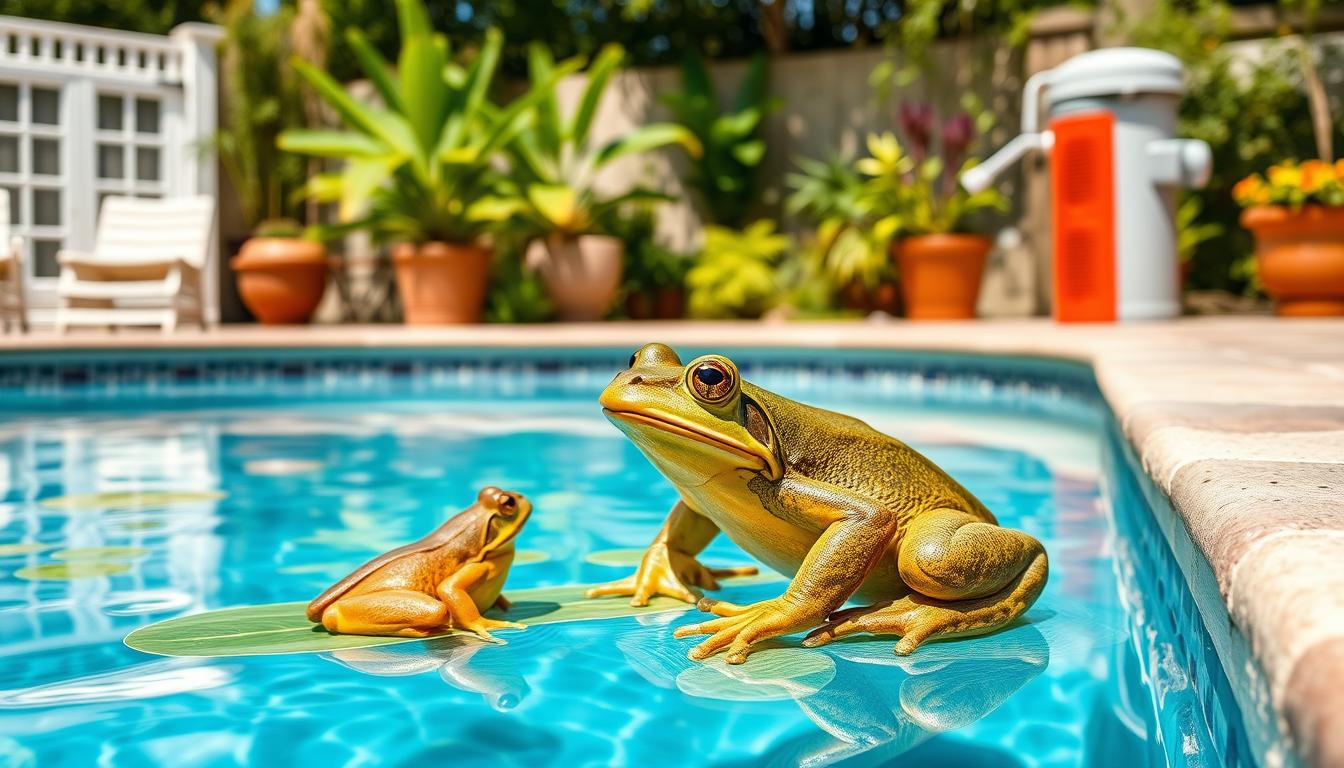
Pool owners look forward to refreshing dips during warm months. But frogs can quickly turn this joy into frustration. Some, like Florida’s cane toads, can even be toxic.
To maintain a frog-free pool, understand what attracts them. Implement effective and humane repellents. This ensures proper pool maintenance and a pleasant swimming experience.
Frogs are drawn to pools that look like their natural homes. These offer a safe space free from predators. Algae and bright lights can make your pool even more appealing to frogs.
Frogs may settle in or lay eggs if left unchecked. This can lead to tadpoles hatching, creating a bigger problem.
Chlorinated pools can harm frogs. Their skin absorbs water and chemicals. Too much exposure can dehydrate and kill frogs.
Some frog species are protected by law. Harming them can have ecological impacts or legal consequences. Check local wildlife rules to know which species need special care.
Use humane removal and repellent methods. Physical barriers and smart landscaping work well. These are effective for keeping frogs away from your pool.
Key Takeaways
- Frogs are attracted to pools that resemble their natural habitats, offering shelter and a food source.
- Chlorine and other pool chemicals can be harmful to frogs, causing dehydration and death.
- Some frog species are protected by law, requiring humane removal and deterrent methods.
- Effective frog repellents include physical barriers, water movement, lighting management, and natural deterrents.
- Maintaining a clean pool and tidy landscaping can minimize frog hideouts and reduce their presence.
Understanding Frog Attraction to Pools
Frogs are drawn to pools for several reasons. These factors are crucial for their survival and breeding habits. Understanding these can help us keep pools frog-free while protecting the ecosystem.
Water as a Basic Need for Amphibians
Frogs need moisture to survive. Their skin absorbs water and oxygen, making pools an ideal habitat. During dry spells, pools become even more appealing to frogs.
Insects Drawn to Pool Lights Provide a Food Source
Pool lights attract insects at night. This creates a feast for frogs, who are opportunistic eaters. Controlling insects near pools can help reduce frog presence.
Pools Offer Safety and Breeding Grounds for Frogs
Pools provide frogs with safety from predators. The water’s depth and clarity deter some threats. Still pool water is perfect for frog breeding.
Frogs lay eggs in calm, shallow water. Pools offer an ideal environment for their reproduction.
| Frog Attraction Factors | Explanation |
|---|---|
| Water as a basic need | Frogs require moisture to survive and absorb water through their skin |
| Insect attraction to pool lights | Lights draw insects, providing a food source for frogs |
| Safety from predators | The depth and clarity of pool water can deter some predators |
| Suitable breeding grounds | Still, shallow water in pools is ideal for frogs to lay their eggs |
Understanding these attraction factors helps us create frog-free pools. We can develop strategies that respect amphibians’ needs while maintaining a clean swimming environment.
How to Keep Frogs Away from Pool
Frogs love pools, but you can make yours less appealing. Use these strategies to enjoy a frog-free swim. You’ll keep your pool clean and healthy too.
Install Physical Barriers like Fences and Pool Covers
Physical barriers are great for keeping frogs out. Pool fencing costs $1,500 to $10,000, depending on size and type. Choose fences that frogs can’t climb over.
Invest in a safety cover or solar pool cover. These act as barriers and stop frogs from entering the warm water.
Maintain Constant Water Movement with Pumps and Fountains
Frogs prefer still water for laying eggs. Add fountains or waterfalls to disrupt this calm environment. Moving water makes your pool less attractive to frogs.
This approach also enhances your pool’s beauty. It’s a win-win for both aesthetics and frog prevention.
Manage Lighting to Reduce Insect Attraction
Pool lights attract insects, which frogs love to eat. Use motion sensor lights to reduce constant illumination. This cuts down on insect activity around your pool.
Choose yellow or orange bulbs instead of white ones. These colors are less attractive to insects, further reducing frog food sources.
Use Natural Repellents such as Vinegar and Citric Acid
Create a natural barrier with vinegar or citric acid solutions. Spray these mixtures around your pool area. The mild acidity irritates frogs’ skin, encouraging them to leave.
Citrus fruits contain citric acid, a powerful frog deterrent. Use these solutions carefully to protect your garden plants.
| Natural Repellent | Mixing Ratio | Application Frequency |
|---|---|---|
| Vinegar Spray | 1 part vinegar to 3 parts water | Every 3-4 days |
| Citric Acid Solution | 1 tablespoon citric acid per gallon of water | Weekly |
Keep Landscaping Tidy to Minimize Frog Hideouts
A well-kept garden is less inviting to frogs. Trim your lawn and remove garden debris regularly. This reduces potential hiding spots for frogs.
Consider the placement of water features in your garden. Position them away from your pool to keep frogs at a distance.
Conclusion
Frogs are charming in nature, but not in your pool. With the right measures, you can enjoy a frog-free pool. Use preventive steps, natural repellents, and create alternative habitats. If frogs appear, use humane frog removal to maintain a balanced ecosystem.
Prevent frogs with pool covers, water features, and citric acid. These strategies help achieve effective frog prevention. Enjoy your pool without worrying about unwelcome guests or dead frogs.
Our team offers expert pool building services. We ensure your pool stays pristine and frog-free. Contact us to make your pool dreams come true!







